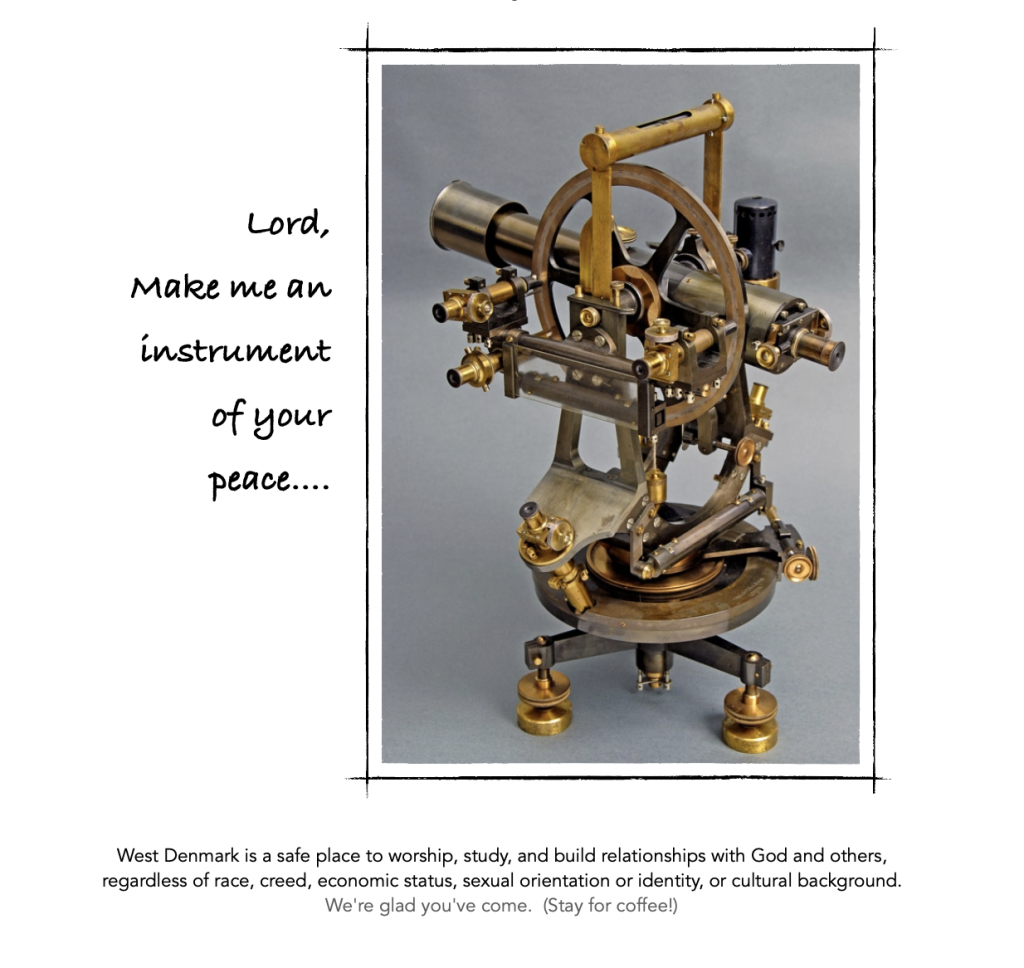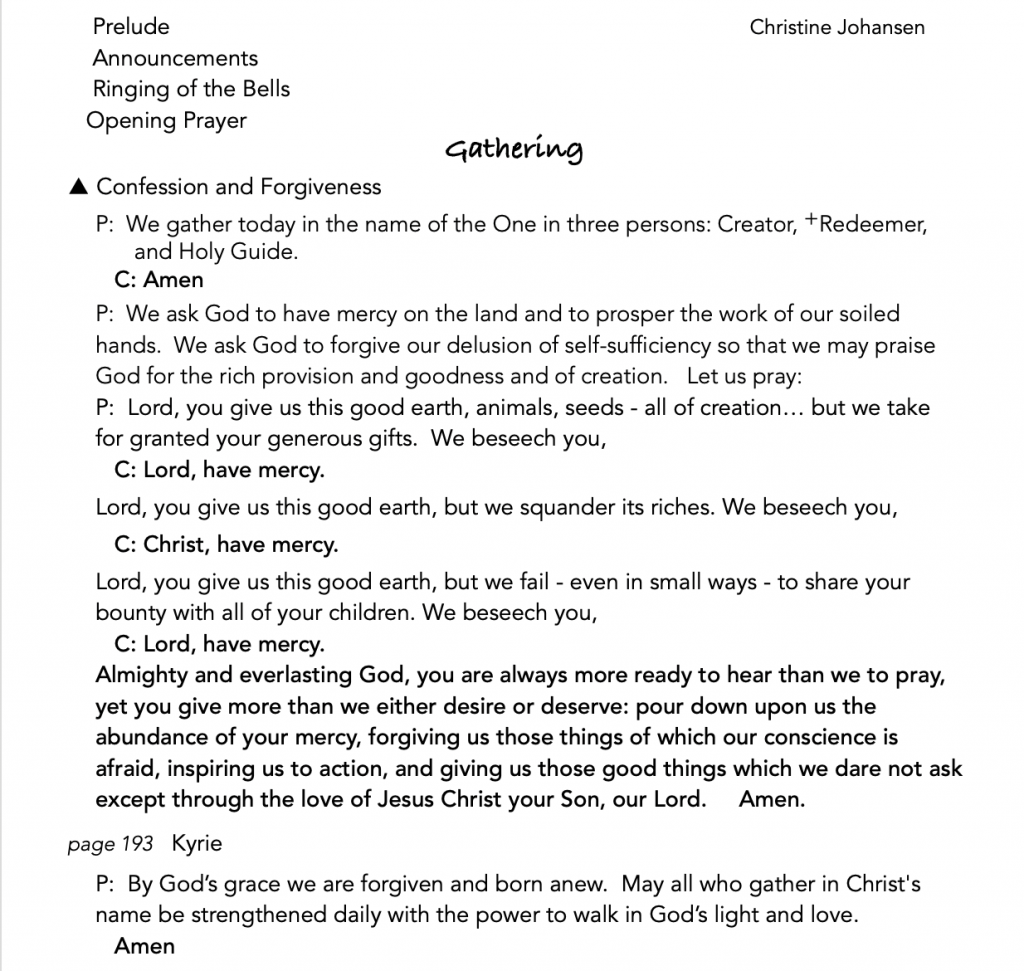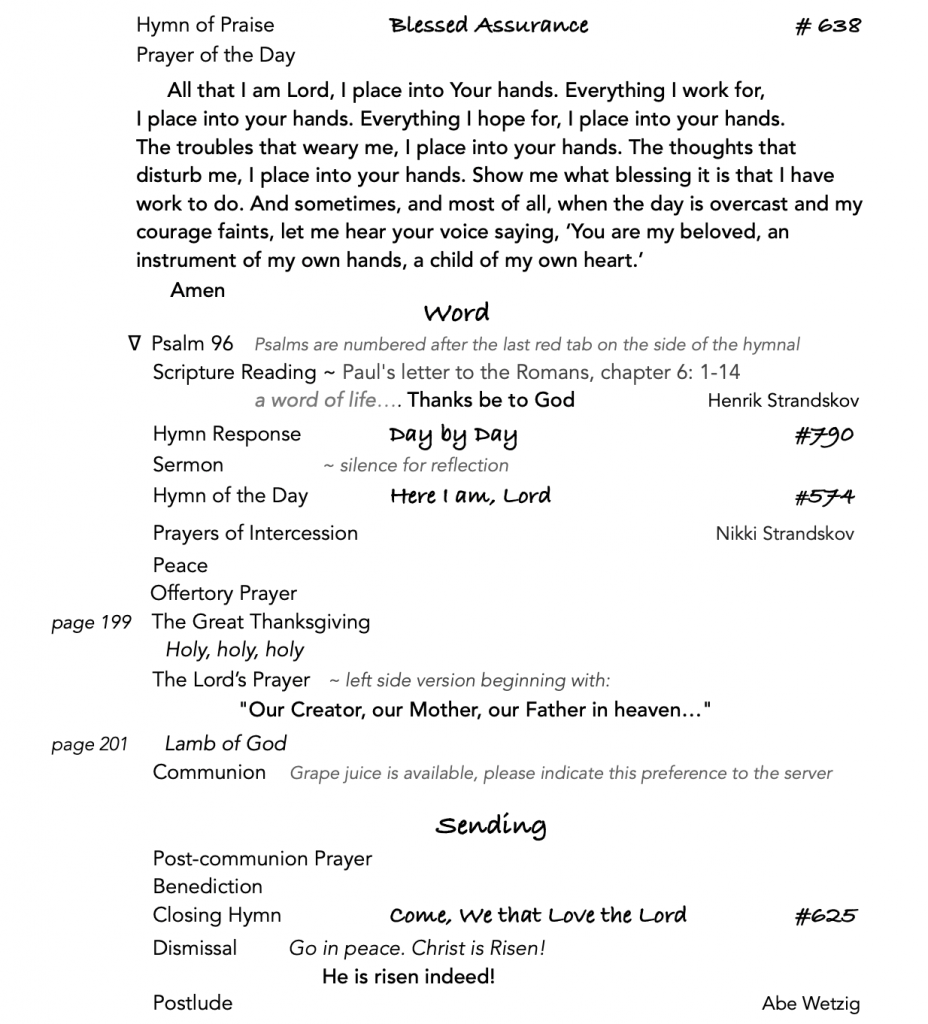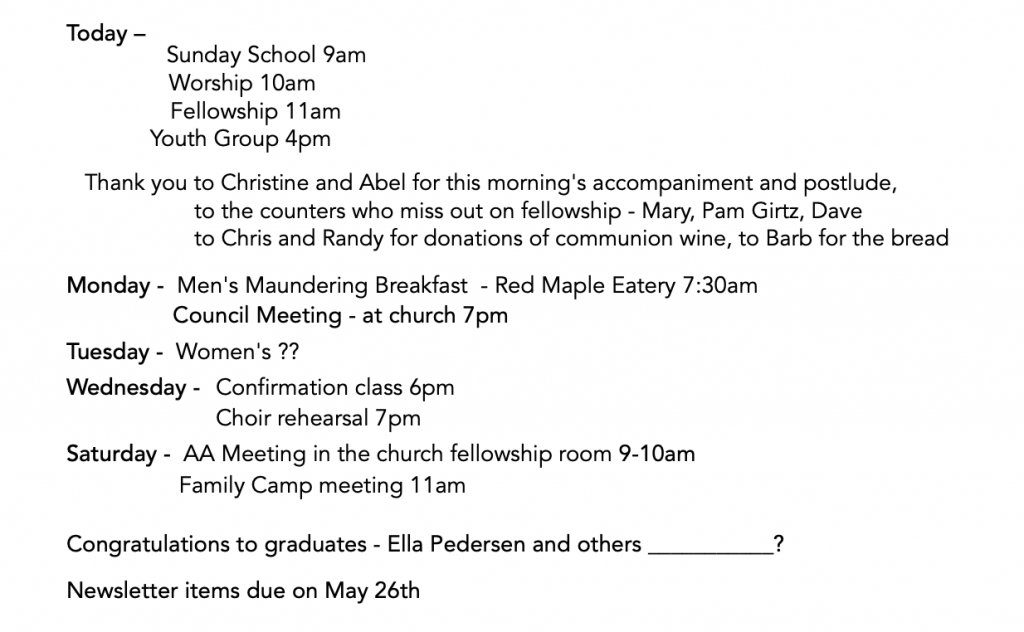Audio Recording



Romans 6:1-14
1 What then are we to say? Should we continue in sin in order that grace may abound? 2 By no means! How can we who died to sin go on living in it? 3 Do you not know that all of us who have been baptized into Christ Jesus were baptized into his death?
4 Therefore, we have been buried with him by baptism into death, so that, just as Christ was raised from the dead by the glory of the Father, so we too might walk in newness of life.
5 For if we have been united with him in a death like his, we will certainly be united with him in a resurrection like his. 6 We know that our old self was crucified with him so that the body of sin might be destroyed, and we might no longer be enslaved to sin. 7 For whoever has died is freed from sin. 8 But if we have died with Christ, we believe that we will also live with him. 9 We know that Christ, being raised from the dead, will never die again; death no longer has dominion over him. 10 The death he died, he died to sin, once for all; but the life he lives, he lives to God.
11 So you also must consider yourselves dead to sin and alive to God in Christ Jesus. 12 Therefore, do not let sin exercise dominion in your mortal bodies, to make you obey their passions.
13 No longer present your members to sin as instruments of wickedness, but present yourselves to God as those who have been brought from death to life, and present your members to God as instruments of righteousness. 14 For sin will have no dominion over you, since you are not under law but under grace.
A word of life … thanks be to God
I have to say, I get lost in this. It becomes a wash of words. However, it’s a familiar wash of words – it’s a commonly used funeral passage – being baptized into Christ’s death, buried by baptism into death, we live a new life in Christ. The death Christ died, he died to sin, once for all; but the life he lives, he lives to God. That sounds familiar and kind of comforting. But, the thing I’ve noticed this time around – when it’s not for a funeral, is that Paul isn’t talking about the afterlife. Not ours, anyway. He’s talking about how we are to live now, on this side of Jesus’ resurrection. His point isn’t to assure us of a happy ending so much as it is to argue us into a changed life.
“…present yourselves to God as those who have been brought from death to life, and present your members to God as instruments of righteousness.“
That’s the line that found a landing for me— instruments of righteousness. What would you say is the difference between an instrument and a tool? I would have expected Paul to use the word tool.
Most of us are well acquainted with the tools in our possession – snow shovels have finally been replaced with garden spades. Rakes, manure forks, hoes, rototillers, trowels – these are the tools of the season.
Or maybe your tools are whisks and blenders and wooden spoons and spatulas.
We have tool drawers and tool boxes and tool bags – I believe that Carl has more than one 3-story rolling tool cart. I have a tool box – but my brother was a dentist. He used instruments. So, what’s the difference? Is it the level of sophistication? Is it precision?
I was looking around the house for instruments – aside from a piano with a warped sound board and a cello with a broken string. I found various probes – meat thermometers, soil testers for moisture and pH, an old calculator that says Texas Instruments. I still have the slide rule of my high school physics days, and a thermometer with the colored glass bubbles that rise in a tube. Maybe instruments have elegance, a note of mystery, imagination.
Barometers and wind-up clocks are instruments loaded with imagination, and so are telescopes and microscopes and brass balances with their boxed sets of incremental weights. Even tuning forks – as simple as they appear to be, are finely calibrated, elegant instruments, not tools.
There are surgical instruments, of course, and odometers, pedometers, speedometers, altimeters …
… and musical instruments of all kinds – well maybe not all kinds. I’ve heard Chris refer to electronic pianos as fancy toaster ovens – so perhaps some instruments leave too much to the imagination and become lowly tools plinking out a tune. But consider the intricacy and precision of the pipe organ…
Does a tool in the hand of an artist become an instrument, I wonder?, or is there some distinction in the nature of the implement itself?
Paul says, “No longer present yourselves to sin as instruments of wickedness, but present yourselves to God as those who have been brought from death to life… present yourselves to God as instruments of righteousness.”
Present yourself to God as an instrument ……. carefully crafted, finely tuned, exquisite, elegant, useful, imaginative, a precision instrument of grace…
Notice that Paul does not say, “Shape up and mold yourselves into this instrument! Work day and night to calibrate your spiritual gearbox to God’s acceptable, exacting specifications. Memorize the schematics, transform yourself from a lowly tool into an instrument of beauty and sophistication…”
Rather, Paul says, “Present yourselves to God as an instrument of righteousness.” Show up. Say, “Here I am, Lord. I am handiwork of the Most High, an instrument of your own design and your own choosing.” Already an instrument of righteousness because of Christ, the thrust of the sentence is to present yourself to God for the work at hand.
What work, then, is this instrument fit to do, I wonder.
In the prayer attributed to Francis of Assisi, we hear, “Lord make me an instrument of your peace. Where there is hatred, let me sow love; where there is injury, let me sow pardon; where there is doubt, let me sow faith; where there is despair, let me sow hope; where there is darkness, light; where there is sadness, let me sow joy.
“Grant that I may not so much seek to be consoled as to console; to be understood as to understand; to be loved as to love. For it is in giving that we receive; it is in pardoning that we are pardoned; it is in dying that we are born again to eternal life.”
This seems like a good beginning – a good way of envisioning the instrumentation of righteousness. This chapter of Paul’s letter to the Romans depicts the power we have in our everyday lives to live in ways that are faithful to God.
As an instrument of grace we allow ourselves to be taken up into the dynamic goodness and generosity of God. That is what resurrection life is about, after all … dynamic goodness and generosity, transformed ways of living. We lean into that – even when it runs counter to our daily reality. Daily life can seem like a tool of Sin and Death and Darkness.
We can’t change the suffering in Gaza or Sudan, Ukraine or Malawi, but we can care enough to offer aid through our church agencies already on the ground there. We can’t end the suffering and mistrust in forever ongoing, systemic racial and political tensions of this country – but we can teach our children to see beyond the color of skin or the clothing of culture. Perhaps we can’t fix the gun culture of this country, or end the opioid deaths, but we can listen to and support with prayer, and join with those voices in the wilderness working to solve problems of hunger and lack of clean water and medical equity, offering a life of dignity. We can stand with those who offer hope.
We can’t, on our own, produce works of righteousness in the world around us. Often, we can’t synchronize them in our own homes — but instruments, with practice, create beauty and order and understanding. And so, without setting down our tools, we practice being instruments.
What we might, in time, accomplish through outer action first begins with our inner workings, our own mechanization, our orientation. “How can we continue living in Sin and Death as though we are still bound by them?” Paul asks. We have been set free. We can no longer be dominated by, or dialed into, the forces of darkness and death. New life draws us out, gives us new vision like the gizmo on the cover of the bulletin. As instruments of righteousness we seek peace, we offer balm to old wounds. As Trekkies know, instruments allow us to explore strange new worlds, seek out new life and new civilizations; to boldly go where Christ has gone before!
Just as being enslaved to sin is an embodied existence, so is being alive to God.
Members of the body of Christ offer living, holy and spiritual worship. We worship by practicing this embodied community in which the gifts of others are valued; in which the instruments of our lives are played or used or practiced on behalf of the body as a whole; in which we show up and say, “Here I am, Lord, what would you have me do? Use me, as an instrument of your peace.”
By opening ourselves to God’s goodness, we not only experience forgiveness and hope, but we begin a journey where that love produces love in us, and through us, for others.
As gadgets of grace we live into the world of what God has done in Christ so that every tool is re-calibrated, every string is tuned, every spring re-wound, every life renewed, every instrument put to its good and proper and valued work. Every one. Every gadget of grace encouraged in your unique capacities. Mary said her soul magnifies the Lord, prophets amplified the Word, Paul, with his fierce passions fortified the fledgling faith – each of us with our tools and skills and passions and perspectives has something to do, something to play, something to create that will reveal God’s loving kindness to us and for others.
Grant us, O Lord, to be instruments of your righteousness, implements of your peace, gadgets of your love, contraptions and gizmos and widgets of your living word. Instruments for the world.
Amen
